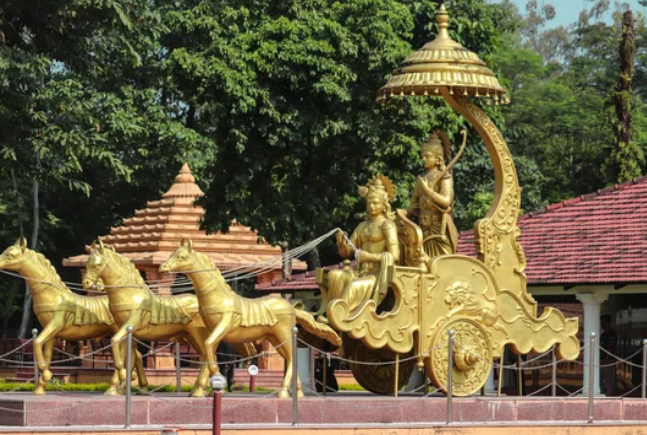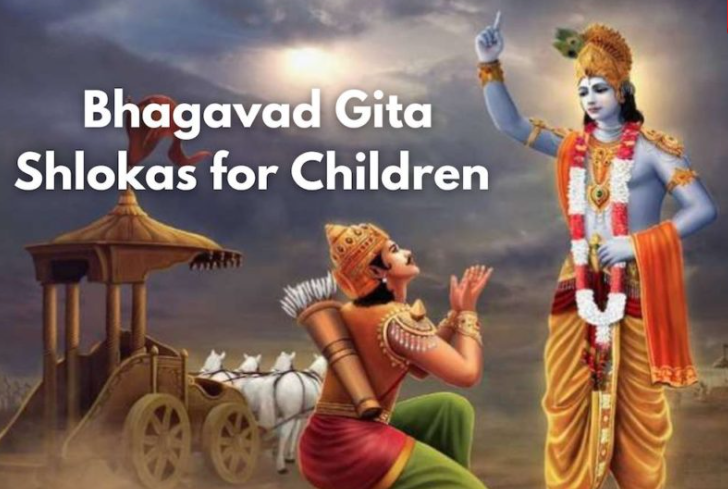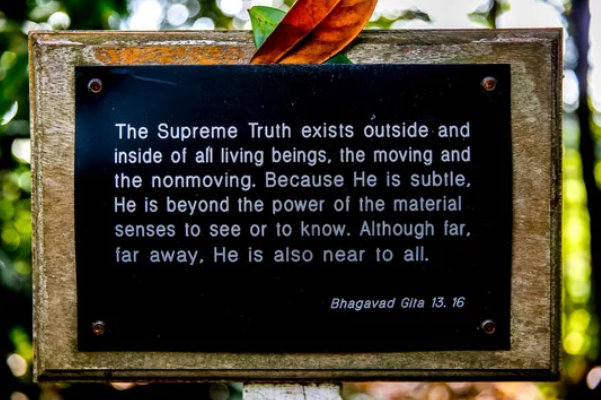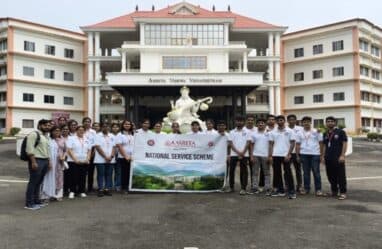5 Encouraging Bhagavad Gita Shlokas for Students

The Bhagavad Gita, often referred to as the Gita, is a timeless and revered scripture that offers profound insights into life, ethics, and spirituality. Among its verses, there are several shlokas that hold special relevance and inspiration for students. These shlokas provide valuable guidance on how to approach learning, overcome challenges, and find inner strength achievements.


The ancient Bhagavad Gita may comfort and inspire youngsters confronting scholastic challenges. Its lyrics include shlokas that inspire pupils. This blog will discuss five inspiring Bhagavad Gita shlokas that may help students succeed, be resilient, and find themselves. These passages give life lessons and a deep sense of purpose and direction in learning and growing.
योगस्थः कुरु कर्माणि सङ्गं त्यक्त्वा धनञ्जय। सिद्ध्यसिद्ध्योः समो भूत्वा समत्वं योग उच्यते।।2.48।।
“Perform your duty with a calm and balanced mind, just like Arjuna. Let go of your attachment to success or failure. This balanced state of mind is called yoga.”
Explanation: This shloka tells students how to study. It teaches us that it’s not about grades or being the greatest, but how we work. Imagine preparing for a huge test. Focus on studying hard rather than obsessing about getting the highest score. Be cool and balanced whether you achieve or fail. The actual gem in your learning path is tranquillity and balance, which yoga signifies. Finding inner calm while working hard and learning. So remember, success isn’t only about the goal (learning), but also the journey.
कर्मण्येवाधिकारस्ते मा फलेषु कदाचन। मा कर्मफलहेतुर्भूर्मा ते सङ्गोऽस्त्वकर्मणि।।2.47।।
“You have the right to do your responsibilities, but don’t expect specific benefits. Don’t let the desire for rewards motivate your actions, and don’t be disappointed when things don’t go as planned.”
Explanation: This shloka imparts a valuable lesson on how to approach our work and studies. Consider a scenario where you are diligently engaged in a project or diligently preparing for an examination. While it is acceptable to have aspirations and strive for favourable outcomes, it is important to refrain from allowing the pursuit of these objectives to dictate one’s behaviour. Instead, prioritise giving your best effort without excessive concern for the potential outcomes. Occasionally, despite our utmost endeavours, outcomes may deviate from our intended expectations. This is also acceptable. Detaching oneself from the outcomes can lead to inner strength and improved performance.


उद्धरेदात्मनात्मानं नात्मानमवसादयेत्। आत्मैव ह्यात्मनो बन्धुरात्मैव रिपुरात्मनः।।6.5।।
“You can help yourself get higher, and you should never let yourself down. You are your best friend and worst enemy at the same time.”
Explanation: This shloka serves as a reminder that we have the ability to inspire ourselves and make improvements in our own lives. In other words, it means the same thing as “believe in yourself.” You become your own best buddy when you establish objectives and put in the effort necessary to accomplish them.
However, when you have self-doubt or give up quickly, you turn into your own worst adversary. Thus, encourage yourself and keep moving ahead in your academics by becoming your own best buddy.


तस्माद्युद्धाय युज्यस्व योगी संख्येऽपि योग्यताम्। एकं वाक्षरमच्युतं यज्ञ इच्छामि तद् ब्रह्म।।8.13।।
“Never forget your goals and keep your mind on them. When your mind is fully focused on your tasks, you’ll be sure to succeed.”
This verse emphasises the significance of maintaining focus on our objectives. Consider a scenario where you are faced with a significant project or examination. To optimise performance, complete focus and concentration are essential. Avoid allowing distractions to hinder progress. Devoting complete attention to one’s studies is crucial for achieving success. By immersing oneself fully in the learning process, students can attain excellence and reach their goals.


यदा यदा हि धर्मस्य ग्लानिर्भवति भारत। अभ्युत्थानमधर्मस्य तदात्मानं सृजाम्यहम्।।4.7।।
“When people do less of what’s right and more of what’s wrong, I come to help bring things back into balance.”
Explanation: This shloka emphasises the significance of adhering to moral and ethical principles. Making wise decisions and demonstrating personal responsibility are essential in both academic pursuits and daily life. Engaging in wrongful behaviour can lead to various issues. However, there is optimism as goodness has a tendency to resurface. It is important to emphasise the significance of being a positive influence in both academic pursuits and personal conduct, as this can contribute to fostering beneficial transformations.
Conclusion
Students typically experience doubt, tension, and confusion when learning. The Bhagavad Gita can guide you through these difficult times. This blog’s five inspiring shlokas encourage students to concentrate on their efforts rather than the results, find power within themselves, be dedicated, and be virtuous. These poems provide life lessons and help you understand yourself and the world.
As they pursue their academic goals, students may rely on the Bhagavad Gita’s deep lessons to motivate, build resilience, and give their studies significance. Gita knowledge transcends time and place, guiding generations of students worldwide. Let these shlokas guide you to greatness, inner serenity, and a better future while you study.







